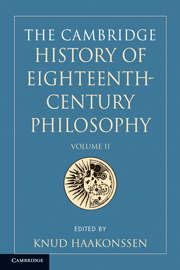Book contents
- Frontmatter
- III Philosophy and Theology
- 21 Natural and Revealed Religion
- 22 Revealed Religion: the Continental European Debate
- 23 Revealed Religion: The British Debate
- 24 Arguments for the Existence of God: The British Debate
- 25 Arguments for the Existence of God: The Continental European Debate
- 26 The Problem of Theodicy
- 27 Religion and Society
- IV Natural Philosophy
- V Moral Philosophy
- Biobibliographical Appendix
- Bibliography
- Index nominum
- Index rerum
- References
26 - The Problem of Theodicy
from III - Philosophy and Theology
Published online by Cambridge University Press: 28 March 2008
- Frontmatter
- III Philosophy and Theology
- 21 Natural and Revealed Religion
- 22 Revealed Religion: the Continental European Debate
- 23 Revealed Religion: The British Debate
- 24 Arguments for the Existence of God: The British Debate
- 25 Arguments for the Existence of God: The Continental European Debate
- 26 The Problem of Theodicy
- 27 Religion and Society
- IV Natural Philosophy
- V Moral Philosophy
- Biobibliographical Appendix
- Bibliography
- Index nominum
- Index rerum
- References
Summary
It is not difficult to agree with the scholars who maintain that the eighteenth century saw the end of philosophical theodicy, or at least of an important chapter in its history. The decisive attack on rational theodicy (and theology) was by Pierre Bayle at the end of the seventeenth century. Much of his work is intended to illustrate the impossibility of a rational, hence philosophical, solution to the question of evil in the world. The Christian conscience, on his view, has to choose between reason (that is, scepticism and ultimately atheism) and fideist religion.
The most important response to Bayle is Leibniz’s Théodicée, which is, on the one hand, an attempt to revive old categories already destroyed by Bayle and, on the other, an original metaphysical construction, which yet does not fulfil its aim of justifying evil. Leibniz’s philosophy, still rooted in the metaphysical framework of the seventeenth century, was one of the main topics of European philosophical discussion in the first half of the eighteenth century. With regard to the question of evil, the so-called optimism of the German philosopher was discussed, defended or condemned, sometimes trivialised and equated with the naive optimism of Alexander Pope.
The question of the human condition and its capabilities became central in mid-century when the crisis in the great metaphysical systems of the past became clear. Worries and doubts that might undermine an optimistic view of the universe and human existence are highlighted in the writings of Samuel Johnson and particularly in Voltaire’s literary and philosophical works.
- Type
- Chapter
- Information
- The Cambridge History of Eighteenth-Century Philosophy , pp. 749 - 778Publisher: Cambridge University PressPrint publication year: 2000

